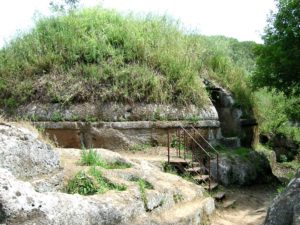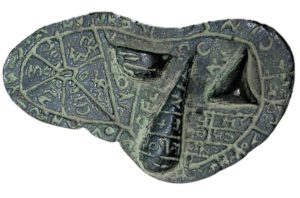Projekttitel: eManual Alte Geschichte
Modul [optional]:
Autor_in: Livius
Lizenz: CC-BY-NC-SA
Liv. III, 52,1-11 – Original
per M. Duillium, qui tribunus plebis fuerat, certior facta plebs contentionibus adsiduis nihil transigi, in Sacrum montem ex Aventino transit adfirmante Duillio non prius, [2] quam deseri urbem videant, curam in animos patrum descensuram; admoniturum Sacrum montem constantiae plebis, sciturosque sine restituta potestate tribunicia redigi in concordiam resne queant.
[…]
[5] in foro praeter paucos seniorum nemo esset, vocatis utique in senatum patribus desertum apparuisset forum, plures iam quam Horatius ac Valerius vociferabantur: ‚quid exspectabitis, patres conscripti? [6] si decemviri finem pertinaciae non faciunt, ruere ac deflagrare omnia passuri estis? quod autem istud imperium est, decemviri, quod amplexi tenetis? [7] tectis ac parietibus iura dicturi estis? non pudet lictorum vestrorum maiorem prope numerum in foro conspici quam togatorum aliorum? quid, si hostes ad urbem veniant, facturi estis? quid, si plebs mox, ubi parum secessione moveamur, armata veniat?
[…]
[10] cum haec ex omni parte iactarentur, victi consensu decemviri futuros se, quando ita videatur, in potestate patrum adfirmant. [11] id modo simul orant ac monent, ut ipsis ab invidia caveatur nec suo sanguine ad supplicia patrum plebem adsuefaciant.
Projekttitel: eManual Alte Geschichte
Modul [optional]:
Übersetzung: Benjamin Oliver Foster
Lizenz: CC-BY-NC-SA
Übersetzung
52. Having learned from Marcus Duillius, who had been a plebeian tribune, that nothing was coming of the endless bickerings of the senate, the commons quitted the Aventine for the Sacred Mount, since Duillius assured them that not until the patricians beheld the City deserted would they feel any real concern; [2] the Sacred Mount would remind them of the firmness of the plebs, and they would know whether it were possible or not that affairs should be reduced to harmony without the restoration of the tribunician power.
[…]
[5] Now that all Rome was desolate with an unwonted loneliness, and there was nobody in the Forum but a few old men, and it appeared, particularly when the Fathers had been summoned to the senate-house, quite deserted, there were many others besides Horatius and Valerius who remonstrated. “What will you wait for, Conscript Fathers?” [6] they cried out. “If the decemvirs persist in their obstinacy, will you suffer everything to go to wrack and ruin? Pray what is that authority, decemvirs, to which you cling with such tenacity? Is it to roofs and walls you will render judgment? [7] Are you not ashamed that your lictors should be seen in the Forum in almost larger numbers than the other citizens? What do you mean to do if the enemy should come to the City? What if, by and bye, the plebs, finding us unmoved by their secession, come with sword in hand? Do you wish the downfall of the City to be the end of your rule? And yet, either we must have no plebs, or we must have plebeian tribunes.
[…]
[10] As these reproaches were flung at them from every quarter, the decemvirs were overborne by the consensus of opinion and gave assurances that they would submit, since it was thought best, to the authority of the senate. [11] They had but this one request to make —which was also a warning, —that their persons might be protected from men’s hate, and that their blood might not be the means of accustoming the plebs to punish senators.
Projekttitel: eManual Alte Geschichte
Modul [optional]:
Autor_in: Falk Wackerow
Lizenz: CC-BY-NC-SA
Leitfragen:
1) Warum greifen die Plebejer zu dem drastischen Schritt des Auszugs?
2) Welche Folgen hat der Auszug für die Stadt bzw. warum ist die Maßnahme so erfolgreich?
3) Welche Schlüsselrolle spielen die Senatoren Horatius und Valerius?
Kommentar:
Noch immer grollt die Mehrheit der römischen Bevölkerung den wohlhabenden Patriziern, insbesondere den aus diesem Stand hervorgegangenen Decemvirn, wegen der ungleichen Machtverteilung. Die Nachricht des Duillius bewirkt nun dahingehend ein Umdenken bei den Plebejern, dass sie sich zu drastischeren Schritten gedrängt sehen. Bei der Entscheidung zum Auszug aus der Stadt wird mit Sicherheit an den Erfolg des ersten Auszugs erinnert worden sein. So erklärt sich auch das Argument des Duilius, nur das Verlassen Roms werde den Patriziern die Augen öffnen. Aufgrund des andauernden Krieges mit den Sabinern, für den die Plebejer das Gros der Truppen stellen, ist der Druck auf die Senatoren dieses Mal besonders hoch. Der Auszug lässt die Stadt in Kriegszeiten ohne Verteidigung zurück. Die Wahl des Ortes fällt erneut auf den sacer mons. Sicherlich soll diese Ortswahl den Patriziern den ersten Auszug der Plebs in ungute Erinnerung rufen und die Rechtmäßigkeit der Forderungen unterstreichen. Durch den Ortswechsel erhöhen die Plebejer nochmals den Druck auf die Senatoren, denn der vorausgegangene Auszug auf den ebenfalls nicht zum Stadtgebiet gehörenden Aventin hatte nicht den erhofften Erfolg gebracht.
In dieser angespannten Situation ergreifen Valerius und Horatius das Wort und überzeugen ihre Mitsenatoren, auf die Forderungen der Plebejer nach eigenen Tribunen einzugehen. Dabei beschwören sie zweierlei Schreckensvisionen herauf: einen äußeren Angriff, gegen den Rom im Moment schutzlos dastehe, sowie eine gewaltsame Revolution der Plebs. Beides, so sagen sie, würde das Ende Roms bedeuten. Mit diesen Argumenten gelingt es ihnen, die Mehrheit des Senats und schließlich auch die Decemvirn zu überzeugen. Deren Leben zu schützen ist die einzige Bedingung, mit der schließlich die Gesandten zu den abtrünnigen Plebejern geschickt werden.



